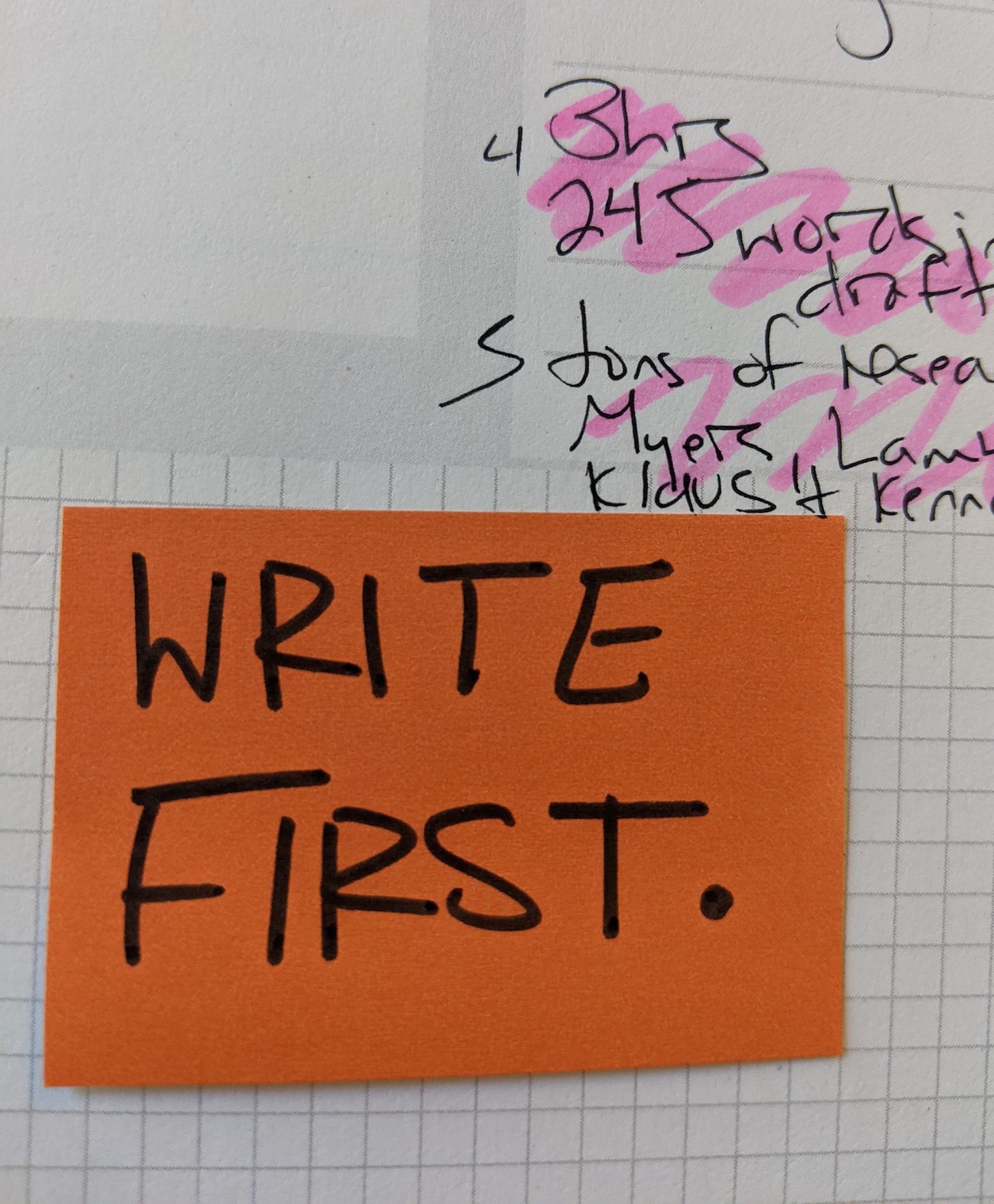Hi there. Welcome to Week 0 of Back to Writing, the 8 week series that aims to reinvigorate your writing practice with encouragement and accountability. We’ll start today by setting your vision and identifying ways to track your progress toward that vision.
A slight tangent first: as I’ve shared before, I grew up in Pittsburgh, and though I live in New Jersey now, I’m still a yinzer in my heart. I spent two weeks in Pittsburgh this summer, and one of the ways I reconnected with the city was daily runs on the Three River Heritage Trail, which runs the length of the Allegheny, from Millvale to the stadiums. Bridges along the way connect to the Strip, downtown, and Point State Park. In the last two summers, I’ve discovered a love for running bridges.
The 31st Street Bridge is my favorite. If I look at the bridge as I’m approaching, or if I look for the peak as I’m running it, I’m certain it’s impossible. But if I keep my head down a little and just run one chunk at a time, I can do it. I don’t have a picture of it because I didn’t want to stop to think about the whole thing before I’d done it. The bridge has a slight bend in it so that as you’re running back toward the north side of the Allegheny, you can see it turn and start to slope down. You’re not done yet, but you can see that you’re getting there.
As we get started this week, let’s think both about the end point and about that bend. What do you want to have accomplished by the end of these eight weeks? How will you know you’re on your way?
Setting Your Vision
What’s your goal for this eight week series? Do you have a project you’ve been wanting to get back to? Drafts of pieces you want to wrap up and send out? A long project you want to recommit to working on regularly? Do you just want to remember how good it feels to have a regular writing practice?
I’d encourage you to identify a vision for your work in the next 8 weeks that includes goals for both product and process.
Here’s what I mean: the product is the actual thing you’re going to produce. You might want to draft a new chapter or two, or revise an essay or a handful of poems. You might have a target in terms of word count. Those tangible outcomes are important because achieving them builds confidence. (And allows you to make progress toward actually getting the writing out into the world.)
But I also want you to think about your writing process. How do you want to feel about your writing practice and the way that writing fits into your life? If you’ve been struggling to make time for writing, your process goal might be to write x days per week, or to write for y minutes a week. Maybe you’re struggling with self-doubt and actually finishing projects; in that case, you might set a goal of writing with confidence and sharing your work with someone. (I’ve got tips on writer’s block and imposter syndrome coming in this series!) Or maybe you struggle with digital distractions when you write and want to recommit to sustained writing time, rather than writing slash twitter slash email checking sessions. (Does the specificity of that final item give a clue about what I’m working on this fall?)
So let’s do this: write down your vision for your work over the next eight weeks. What do you want to accomplish? How do you want to feel about your writing life? What distractions and obstacles will you need to clear away? If you want, post this vision somewhere you’ll see it regularly. It could be a recurring reminder on your phone, or an index card taped near your writing space, or a post-it note in your planner.
Keeping a Compelling Scorecard
So how will you know you’re on the way? I’ve written before about the benefit of counting the things that matter in your writing life:
There are different ways of quantifying writing progress - time, word count, or milestones like finishing a scene or drafting a new poem. You should count whatever’s going to motivate you to keep working. Word count can be great if you’re getting started and want to develop a sense of momentum; time can be helpful if you’re in a slow part with lots of research or revision and need to give yourself credit for your efforts. Whatever you choose, set a target and make a plan for how to track it.
Cal Newport calls this practice “keeping a compelling scorecard.” For this 8-week series, I’m going to suggest that you create a scorecard that includes both quantitative and qualitative measures - not just the words you’ve produced or the time you’ve devoted to your writing, but how you felt about it.
Your scorecard can be any number of things: a check mark in your planner, stickers that show each completed pomodoro, an excel sheet that records your words or writing time. The goal is to set up an easy way to track, day by day or week by week, that you’re moving toward your writing goals. You want to be able to see the bend in the bridge.
I’ve long recorded time, word count, or milestones in a project, and I’ve found that the easiest way for me is just to write what I’ve done in my planner. I highlight writing work in pink so it jumps right out at me; you can see a bit of it in the photo above.
What I’m doing differently this fall is using a scorecard that also records the qualitative experience of writing: my level of focus, any distractions or obstacles, and how I managed them. My plan right now is this: before each writing session I’m going to jot down three things: my goal, any distractions or obstacles I anticipate, and what I’ll do if I get stuck. And then at the end, I’m going to write a quick reflection on how it went. We’ll see how it goes. If this turns out to be cumbersome, I’ll adjust.
So here’s your second task for today: Create a scorecard that will allow you to see your writing process at work.
two tasks for today
Write down your vision for your writing for the next eight weeks. What do you want to finish, or what progress do you want to make? What do you want to be able to say about your writing practice?
Create a scorecard that will allow you to track your progress toward those goals for product and process.
The idea here is not to set some wild and unattainable goal. We’re not sprinting, and we’re not even training for a marathon. We’re aiming for a writing practice that is more like a daily walk—a practice that becomes a core part of your life, something you can keep up from here on out, that you’ll look forward to and grow into over time.
What’s your vision for the next 8 weeks? I’d love for you to share it in the comments below. (I’ll add mine, too. ;) )
You’ll get the next newsletter, with tips about finding, making, and stealing time for writing, early Monday morning. I’m so happy to be writing with you all through the next eight weeks. Let’s start.
I’d love to hear about your goals for your writing over the next 8 weeks, how you’ll be tracking your progress, or any obstacles you’re anticipating will come up. If you have a friend you think would benefit from some encouragement in their writing life, I’d love for you to share this newsletter. You can always reply to this email, comment below, or find me on twitter (@nancy_reddy) and instagram (@nancy.o.reddy).







okay, I am publicly committing to my goals: 1) finishing revisions on a query letter and proposal and submitting to agents, 2) sending out two new pitches, 3) revising and submitting two essays, and 4) at least 3 focused (no twitter/etc) writing sessions/week. what about you all?
Reg the "how it feels" side of things:
Recording what distracts, what nourishes, and what was pleasurable (the latter two usually overlapping pretty precisely)...
Being forgiving toward what I have time or headspace for, closely linked with acknowledging on a google sheet what I actually have done...
Setting a reading and writing plan prior to each day.